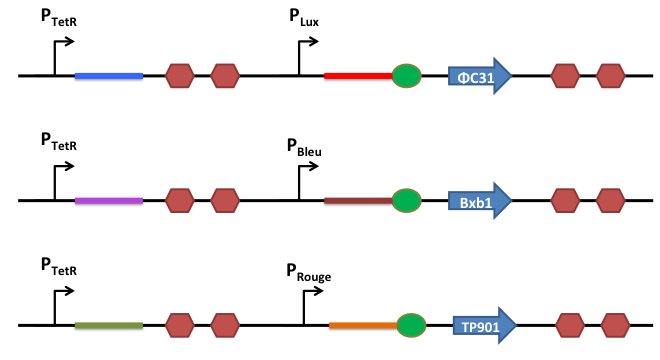Team:INSA Toulouse/contenu/project/biological construction/riboregulation
From 2013.igem.org
| Line 109: | Line 109: | ||
<p class="texte"><i>Description des conditions d'expérimentation</i></p> | <p class="texte"><i>Description des conditions d'expérimentation</i></p> | ||
| - | + | ||
| - | + | ||
| - | + | ||
| - | + | ||
| - | + | ||
<br> | <br> | ||
<br> | <br> | ||
Revision as of 13:54, 1 October 2013
Biological Modules
Riboregulation System
In order to better control the expression of the recombinases, we design a riboregulation system to have well controlled promoters before our recombinases.

How does it work ?
This is the basic system : Two inductible promoters each followed by a RNA sequence

The blue and the red regions are regions which code for little RNA sequences.
When the promoter P2 is activated and not the P1, the red sequence will be transcripted. This red sequence possesses a similarity with the rbs sequence (in red). So when transcripted the red sequence will confine the rbs and prevent the recombinase from being translated.

When both promoters are activated, both sequences (the blue and the red one) are transcripted. The blue RNA sequence possesses a stronger similiraty with the red one. When transcripted the blue and the red sequences will match together and release the rbs to permit the translation of the recombinase.

Deeper in the design : RNA secondary structures formation




Description des conditions d'expérimentation
Our strategy
These publications "Genetic switchboard for synthetic biology applications" and "Engineered riboregulators enable post-transcriptional control of gene expression"inspired us. In their work they present one riboregulation system with this idea, we choose to design other riboswitches keeping some sequences from the original one and changing some nucleotides. It will aim use to have one riobregulation system specific for each input, then to do not have conflict. Furthemore, it will give use the possibility to characterize and compare the systems.
 "
"

